On the left sleeve of his khaki uniform, every soldier of the Pakistani army proudly wears an emblem – two white crossed swords on a green background. That striking image provides the title for Shuja Nawaz’s copious history of the Pakistani army.
With half a million men in uniform and several hundred thousand in reserve, it is a formidable fighting force. What it lacks in conventional weaponry it makes up in its panoply of nuclear weapons and ballistic missiles.
The army regards itself as the heir to the martial traditions going back centuries to the days of early Islam. Indeed, the generals who commanded the British Indian army often referred to their Muslim soldiers as being a martial race.
But the army’s most prominent role in Pakistan’s history has not been that of a military force but that of a governing body. In the early sixties, Prime Minister Nehru of India is believed to have said that while other states had armies, in Pakistan the army had a state. His counterpart, Field Marshal Ayub, Pakistan’s first military ruler, never disputed that contention. In fact, he often thought of his country as the Prussia of the subcontinent.
Commenting on the army’s frequent political interventions, the historian Stanley Wolpert once called the Pakistani army a wolfhound that was not afraid to turn on its master. These two faces of the army, military and civilian, have conflicted so often in history that Nawaz’s book could well have been sub-titled Crossed Circuits.
Nawaz is neither a soldier nor a social scientist but a journalist. The strength of his book derives from his interviews with serving and retired military officers. He comes from an army family and his brother once led the army. But he does not let these personal ties bias his research.
Troubled by army’s frequent coups, he quotes Musharraf’s predecessor (who also served as his ambassador to Washington) as saying that the army has done no better than the civilians when it comes to ruling the country.
And when it comes to fighting wars, Nawaz shows in meticulous detail that the army has a weak resume. So much for Musharraf’s assertion when he seized power that the army had never let the nation down.
For much of its history, the army has carried out misguided adventures against the much larger Indian army, believing until 1971 that one Muslim soldier was worth ten Hindu soldiers. More recently, it has been engaged in operations against rag-tag bands of militants allied with Al Qaeda in the tribal areas of Waziristan. These battles have not gone well. Indeed, they have given the Americans an excuse to directly target the militants through drone-launched missiles. Scores of civilians have been killed in the process, further hampering the army’s job.
Last year, the army raided a mosque in the heart of Islamabad, where militants affiliated with the Taliban were holed up. That operation did not go well. Similar operations against dissenters in prior decades have been carried out in the provinces of Sindh and Balochistan, all with singular lack of success.
The biggest failure was in 1971 when the army’s decision to not uphold the results of a general election precipitated a civil war in the majority province of East Pakistan. This prompted an Indian invasion several months later which concluded with the surrender of the Pakistani garrison and the secession of East Pakistan.
That failure led the army to acquire nuclear weapons. Widely regarded as the crown jewels of the arsenal, they have now become the object of much desire for terrorists and brought Pakistan front and center in America’s war against terror.
Ayub Khan, who seized power in 1958, was very popular in the beginning because he seemed capable of ridding the country of the miasma of corruption and incompetence that had entered its body politic during the first decade of civilian rule. His economic policies stimulated growth in the 1960s but also heightened economic inequalities between classes and exacerbated tensions between the eastern and western provinces.
A decade later, he left the country in disgrace after having presided over a failed war with India in 1965. His successor, General Yahya Khan, held fair elections but refused to hand over power to the victors. He presided over the 1971 dismemberment of the country. General Zia held non-political elections and presided over a proxy war with the Soviets in Afghanistan during the 1980s. While the war brought about the defeat of the Red Army, its legacy –Al Qaeda and the Taliban—continues to haunt not only Afghanistan or Pakistan but the entire world.
And General Musharraf, while making a well-advertised U-Turn on the Taliban in the country’s foreign policy under American pressure, failed to rein in the religious militants on the home front. Despite Musharraf’s loud talk of enlightened moderation, the country is even more divided along ethnic, sectarian and other fault lines than it was in 1999 when he seized power.
Despite the considerable heft of Nawaz’s history, which checks in at 655 pages, we are left searching for a theory that would explain the army’s troublesome past behavior, much less predict its future.
Why do some army chiefs carry out coups and others don’t? Is it their personality, the circumstances, external influences or something else? And what can be done to prevent a fifth coup which would end Pakistan’s third democratic transition?
Why does the army consistently under-estimate its enemies, fail to coordinate its operations with the navy and air force and count on its allies to bail it out when it fails? Why does it not learn from its failures? Is the promotion process flawed? Is loyalty rather than skill the main criterion in the selection of general officers?
What can be done to reorganize the army to fight tomorrow’s wars? Can anything be done to trim defense spending and focus on the human development of the country? What, if anything, can be done to stop the intrusion of the military in the economy?
And, most importantly, why does the Indian army, the larger twin of the Pakistani army, not intervene in politics?
The reader would be hard pressed to find answers to these fundamental questions in Crossed Swords. But even with its limitations, Nawaz has penned a book which will become a standard reference on the Pakistani army for years to come.
One hopes it will also be read, and read carefully, by aspiring general officers. It is still a ways away from being “the finest fighting force in Asia,” a goal that was articulated for it by Zulfikar Ali Bhutto when he took over as the first civilian ruler of Post-Bangladesh Pakistan.
Ahmad Faruqui, an associate of the Pakistan Security Research Unit at the University of Bradford, is the author most recently of “Musharraf’s Pakistan, Bush’s America and the Middle East,” Vanguard Books, Pakistan.
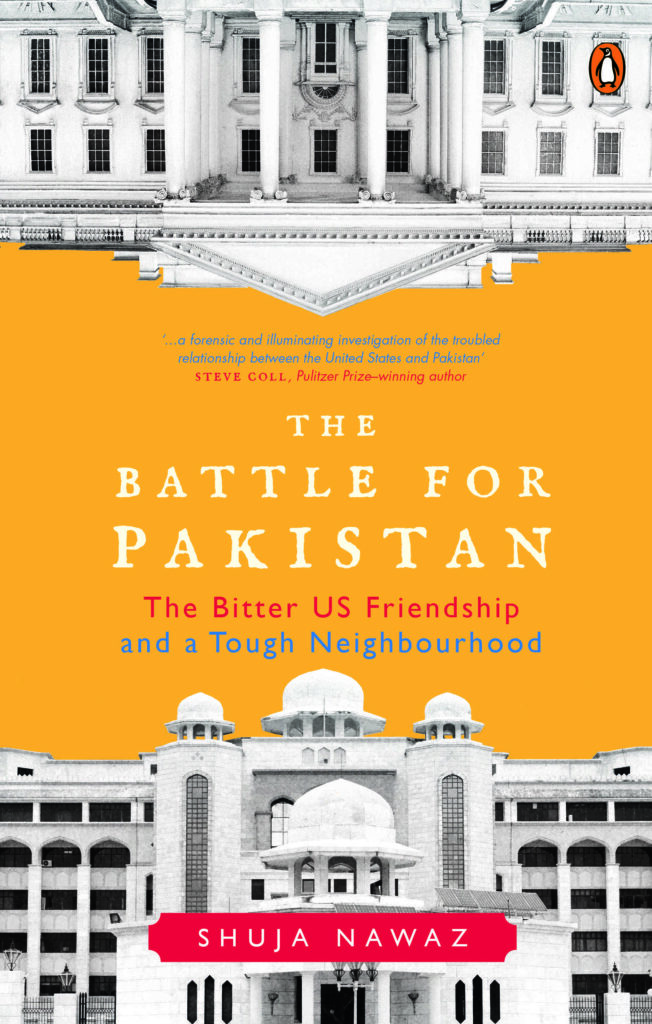
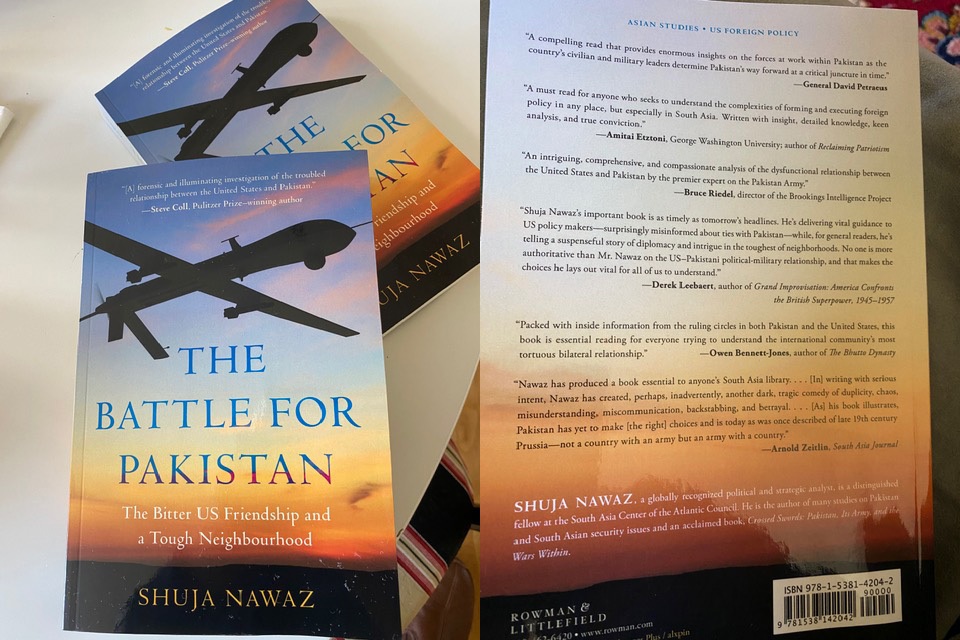
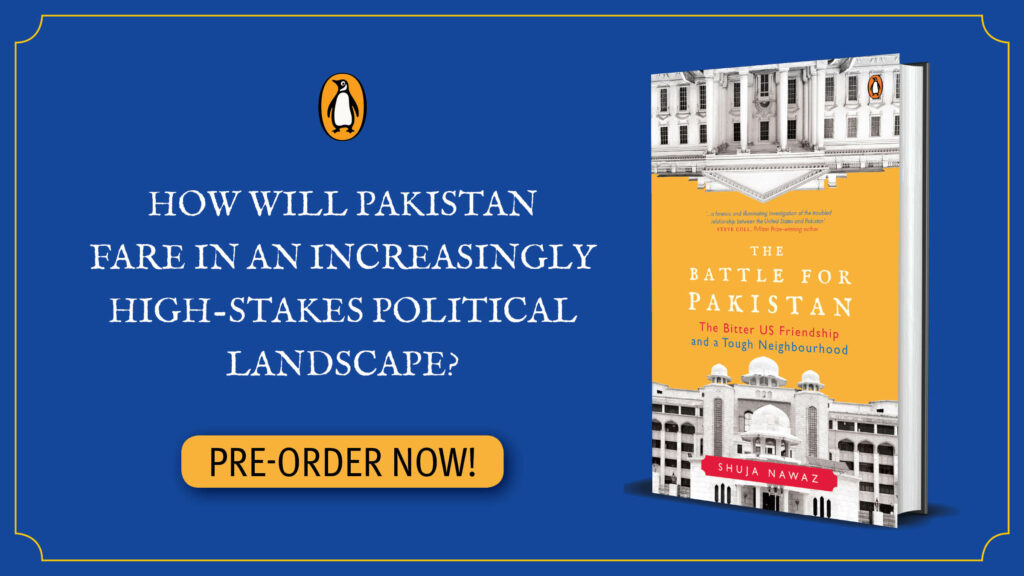
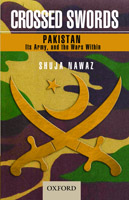 Based on 30 years of research and analysis, this definitive book is a profound, multi-layered, and historical analysis of the nature and role of the Pakistan army in the country’s polity as well as its turbulent relationship with the United States. Shuja Nawaz examines the army and Pakistan in both peace and war. Using many hitherto unpublished materials from the archives of the United States, the United Kingdom, and the General Headquarters of the Pakistan Army, as well as interviews with key military and political figures in Pakistan and the United States, he sheds light not only on the Pakistan Army and its US connections but also on Pakistan as a key Muslim country in one of the world’s toughest neighbourhoods. In doing so, he lays bare key facts about Pakistan’s numerous wars with India and its many rounds of political musical chairs, as well as the Kargil conflict of 1999. He then draws lessons from this history that may help Pakistan end its wars within and create a stabler political entity. Forthcoming April 2008, Oxford University Press (Pakistan) and May 2008 OUP, USA. Updated 2nd edition 2017.
Based on 30 years of research and analysis, this definitive book is a profound, multi-layered, and historical analysis of the nature and role of the Pakistan army in the country’s polity as well as its turbulent relationship with the United States. Shuja Nawaz examines the army and Pakistan in both peace and war. Using many hitherto unpublished materials from the archives of the United States, the United Kingdom, and the General Headquarters of the Pakistan Army, as well as interviews with key military and political figures in Pakistan and the United States, he sheds light not only on the Pakistan Army and its US connections but also on Pakistan as a key Muslim country in one of the world’s toughest neighbourhoods. In doing so, he lays bare key facts about Pakistan’s numerous wars with India and its many rounds of political musical chairs, as well as the Kargil conflict of 1999. He then draws lessons from this history that may help Pakistan end its wars within and create a stabler political entity. Forthcoming April 2008, Oxford University Press (Pakistan) and May 2008 OUP, USA. Updated 2nd edition 2017.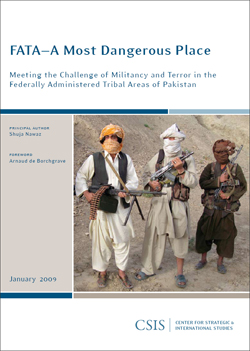 Increased militancy and violence in the border region between Afghanistan and Pakistan known as the Federally Administered Tribal Areas of Pakistan has brought FATA into sharper focus, as U.S., Afghan, and Pakistani leaders attempt to find solutions to the problems underlying the situation there. This most dangerous spot on the map may well be the source of another 9/11 type of attack on the Western world or its surrogates in the region. Should such an attack occur, it likely will be spawned in the militancy that grips FATA and contiguous areas in Afghanistan and Pakistan today. The principal actors are the Taliban, in both countries; their allies—former Soviet-era mujahideen commanders including Gulbadin Hekmatyar of the Hezbe Islami and the Haqqani group (headed by Jalaluddin and his son Siraj); Sunni militants from Central and Southern Punjab; and al Qaeda, which benefits from links to most of these insurgents. The Taliban leader Mullah Omar is suspected to be hiding in southwestern Afghanistan and Pakistani Balochistan. The Taliban are engaged in a struggle against foreign forces inside Afghanistan and now against the military in Pakistan. Hekmatyar has spoken against the Pakistani government but has not yet taken up arms against it. The Haqqanis have also not provoked a battle with the Pakistani forces as yet. The Punjabi militants, however, have become franchisees of al Qaeda and have been linked to attacks on the Pakistani state and its army.
Increased militancy and violence in the border region between Afghanistan and Pakistan known as the Federally Administered Tribal Areas of Pakistan has brought FATA into sharper focus, as U.S., Afghan, and Pakistani leaders attempt to find solutions to the problems underlying the situation there. This most dangerous spot on the map may well be the source of another 9/11 type of attack on the Western world or its surrogates in the region. Should such an attack occur, it likely will be spawned in the militancy that grips FATA and contiguous areas in Afghanistan and Pakistan today. The principal actors are the Taliban, in both countries; their allies—former Soviet-era mujahideen commanders including Gulbadin Hekmatyar of the Hezbe Islami and the Haqqani group (headed by Jalaluddin and his son Siraj); Sunni militants from Central and Southern Punjab; and al Qaeda, which benefits from links to most of these insurgents. The Taliban leader Mullah Omar is suspected to be hiding in southwestern Afghanistan and Pakistani Balochistan. The Taliban are engaged in a struggle against foreign forces inside Afghanistan and now against the military in Pakistan. Hekmatyar has spoken against the Pakistani government but has not yet taken up arms against it. The Haqqanis have also not provoked a battle with the Pakistani forces as yet. The Punjabi militants, however, have become franchisees of al Qaeda and have been linked to attacks on the Pakistani state and its army.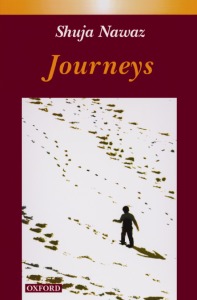 Journeys is Shuja Nawaz’s travelogue that traces a complex of journeys across the globe. But wherever he goes, the pull of memory draws him towards Pakistan. He captures the sounds and the sights of his homeland while viewing foreign lands through the lens of a native Punjabi. He attempts to revisit and revive many of the rhythms and rhymes of Punjabi poetry in English verse, using his experience with translations, including that of the Potohari verse of the late Baqi Siddiqui of Rawalpindi. This book of verse is a celebration of Shuja Nawaz’s deep and strong emotional links with the land of his birth. Published by Oxford University Press 1998. Out of Print.
Journeys is Shuja Nawaz’s travelogue that traces a complex of journeys across the globe. But wherever he goes, the pull of memory draws him towards Pakistan. He captures the sounds and the sights of his homeland while viewing foreign lands through the lens of a native Punjabi. He attempts to revisit and revive many of the rhythms and rhymes of Punjabi poetry in English verse, using his experience with translations, including that of the Potohari verse of the late Baqi Siddiqui of Rawalpindi. This book of verse is a celebration of Shuja Nawaz’s deep and strong emotional links with the land of his birth. Published by Oxford University Press 1998. Out of Print.